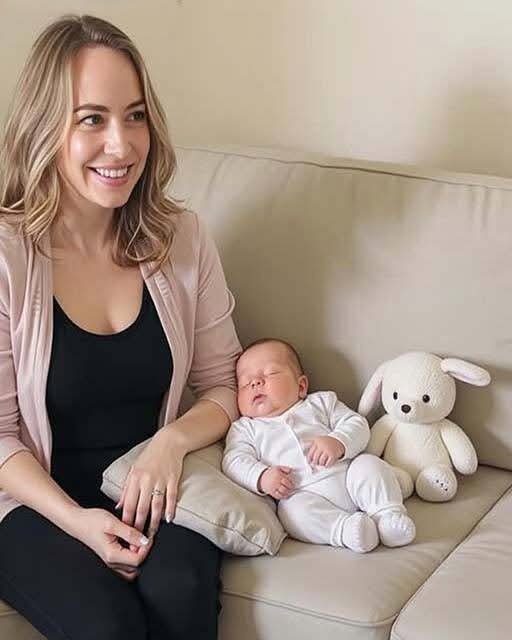My Husband and In-Laws Demanded a DNA Test for Our Son, I Said Fine, But What I Asked in Return Changed Everything
My mother-in-law never liked me. She didn’t have to say it outright—I saw it in her eyes, the way she corrected me in front of others, the constant comparisons to Adam’s ex. Denise was never subtle about her disapproval. Coming from a modest family without country clubs or brunch traditions didn’t help my case. And when Adam and I eloped, denying her the wedding she wanted to orchestrate, she made her opinion loud in the quietest ways.
Still, I had hoped the birth of our son would soften her. And at first, I thought it had. She came over a week after I gave birth, held our baby with a smile, cooed over him as if she cared. Then she disappeared. Ignored texts. Canceled visits. A wall of silence.
I didn’t know, then, that behind that silence a storm had been brewing.
One night, after I finally got the baby down, Adam joined me on the couch. He looked tense. Uneasy. Something was off. That’s when he told me—his parents had been talking about a DNA test.
They had read some article about paternity fraud, and now, they wanted “clarity.” He used their words—“just to clear the air.” I stared at him, waiting.
“Do you think we should?” I asked.
He didn’t answer right away. Just avoided my gaze. “It couldn’t hurt… just to settle things.”
I didn’t cry. I didn’t yell. I just said, “Fine. We’ll do it. But only if we run a second test as well.”
He looked confused. “Another test?”
“Yes,” I said. “One to determine if you’re your father’s biological son.”
His face twisted. “You’re serious?”
“As serious as your mother accusing me of cheating. If I’m being tested for honesty, so is she.”
He sat there for a moment, stunned. Then nodded. “That’s fair.”
Our son’s test was easy—a simple cheek swab. But for the second part, we had to be a little more creative. A few nights later, we invited Adam’s parents over for dinner. Denise brought her famous fruit pie. Adam chatted with his dad about golf and handed him a new eco-friendly toothbrush sample from work.
After dinner, his dad used it. That’s where we got our second DNA sample.
We sent both tests off the next morning.
Weeks passed. Our son turned one. We had a small family party—cake, balloons, just the essentials. It felt, for a moment, like a return to normal.
Near the end of the party, I brought out an envelope. Everyone paused.
“We have a little surprise,” I said, smiling tightly. “Since some people were unsure, Adam and I took a DNA test.”
Denise perked up, her wine glass hovering midair. Her smile was hopeful—too hopeful.
I opened the envelope. “He’s 100% Adam’s son.”
Her smile cracked.
But we weren’t done.
Adam pulled out a second envelope. “Since we were already doing tests…”
Denise blinked. “What’s that?”
He opened it. Scanned the page. Then turned to his father.
“I’m not your biological son,” he said quietly.
Silence gripped the room. Denise’s wine glass trembled. She stood up abruptly, voice shaking.
“You had no right—”
Adam cut her off. “No. You had no right. You accused my wife of something she never did. You wanted the truth. Now you have it.”
Denise sank back into her chair, stunned. She began to cry. Adam’s father said nothing. He simply grabbed his keys and left.
In the weeks that followed, Denise tried to reach out—calls, long texts, voicemails filled with half-hearted apologies. We didn’t respond. Her silence had been cruel. Her accusations worse.
But it wasn’t just Denise who had broken something
I had to face my own hurt—the fact that Adam hadn’t stood up for me. That when I was accused of betraying our family, he hesitated. That silence, that doubt, wounded more than anything else.
We started therapy. Week by week, I opened up.
“It wasn’t just the test,” I told him. “It was how alone I felt. You didn’t defend me. You didn’t believe in me.”
He didn’t argue. Just listened. Eyes full of regret.
“I know,” he said softly. “I was weak. But I’ll spend the rest of my life proving that I trust you—and that I’m on your side.”
And he has.
He cut off the noise from extended family. Protected me when tension rose. Showed up—not as the man who once doubted, but as the partner I always hoped he’d be.
I forgave him. Not because I forgot—but because he owned his part, and changed.
We haven’t seen Denise since. Her final voicemail was a tangle of apologies and excuses. I deleted it halfway through and blocked her number.
Adam’s father divorced her not long after the birthday. He never gave an explanation, but he visits us often now—bringing toys, reading stories, spoiling his grandson with quiet joy.
Life moved on. Our son learned to crawl, then walk. He laughed louder each day. We tucked the DNA results into a drawer and never looked at them again.
We don’t need proof.
We know who we are.
And more importantly, we know who isn’t part of that story anymore.
